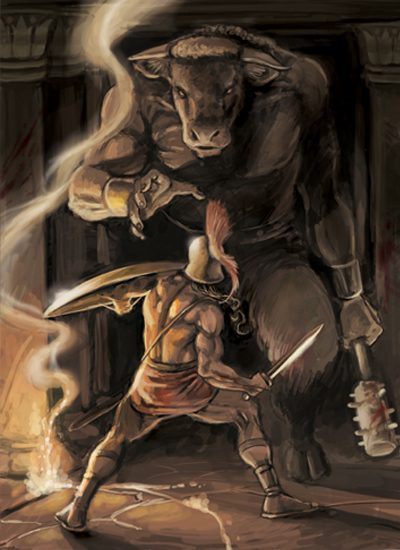Theseus was a Greek hero and was the son of Aethra, princess of Troezen, and daughter of king Troezen. His father was Aegeus, the king of Athens, though there are stories that say that Poseidon, the god of the sea, was Theseus’s father. Theseus was brought up by his grandfather and lived in Troezen, but at the age of only sixteen, he went to Athens and claimed his father, who he believed was Aegeus. Throughout the journey, Theseus killed many others; however, his greatest victory was still yet to come. He eventually encountered the Minotaur, who was a monster that was half human and half bull.1

The Minotaur was son of Pasiphae, queen of Crete and wife of King Minos of Crete. Queen Pasiphae slept with a bull, which is how the Minotaur came to be. A snow-white bull had been sent to King Minos; however, when King Minos did not sacrifice the bull to Poseidon, Poseidon caused Pasiphae to fall in love with the beautiful bull.2 The product of her love was the monstrous Minotaur. This obviously made Minos upset; however, he did not want to kill the monster. He set the architect Daedalus to create and build a labyrinth that made it impossible for anyone to get out without the help of someone else.3
In the labyrinth, the Minotaur was fed young humans, along with several of Minos’ enemies. These humans were victims of Minos, who were forcibly sent by Athens as tribute. Every year, Minos would have seven boys and seven girls sent to the labyrinth, and each year none of the several tributes would return. Once in Crete, they were devoured by the monster-like, blood-thirsty Minotaur. One day, Theseus decided that he would be the one to finally come back out of the labyrinth and end this practice. He, unlike others, volunteered himself as one of the victims. Theseus and the other several hostages sailed for Crete. When Theseus arrived in Crete, he was greeted as the doomed by several locals, and among the crowd was Ariadne, the daughter of King Minos, who immediately fell in love with Theseus and came up with a plan to help him defeat the Minotaur. She gave Theseus a ball of thread that he would fastened to the door of the maze in the labyrinth and unwind the ball until he reached the Minotaur.4

As Theseus and the other victims entered the labyrinth, the Minotaur was sleeping. He immediately took action and wasted no time in trying to defeat the creature. Theseus had absolutely no weapons, not even a sword. He fought the Minotaur hand-to-hand and succeeded, with his very own bare hands, beating the repulsive creature to death with just one blow from the fist. He then helped the other hostages who were in the labyrinth to safety, using the thread to find his way out. After defeating the Minotaur, Theseus and several other Athenians sailed back to Athens, taking along Ariadne. Though Theseus took Ariadne along with him to Athens, he eventually abandoned her on an island.5
On the way back to Athens, Theseus made a promise to his father that he would change the color of his sails if victory was his. Black meant that he had not made it back and white meant that he had; however, Theseus forgot to do so, causing his father to kill himself out of grief. When Theseus’ father died, he became the king of the city-states of Athens. He was honored for his victories and for his win over the Minotaur. He was also honored for making the kingdom larger.6
- Ancient Greece and Rome: An Encyclopedia for Students, 1998, s.v. “Theseus and the Minotaur,” Carroll Moulton. ↵
- Funk & Wagnalls New World Encyclopedia, 2016, s.v. “Minotaur.” ↵
- UXL Encyclopedia of World Mythology, 2009, s.v. “Theseus.” ↵
- The Greenhaven Encyclopedia of Greek and Roman Mythology, 2002, s.v. “Theseus in the Labyrinth,” by Don Nardo. ↵
- Ancient Greece and Rome : An Encyclopedia for Students, 1998, s.v. “Theseus and The Minotaur,” Carroll Moulton. ↵
- UXL Encyclopedia of World Mythology, 2009, s.v. “Theseus.” ↵



41 comments
Ruben Basaldu
This story sounded very familiar to me but I cannot remember if I had heard this story before. Now I am not the most interested in Greek mythology but I thought that the title was interesting enough for me to want to read this article and it was actually really interesting. The author did a good job of keeping my interest throughout the article. Also, I thought that it was just Theseus by himself but it was interesting to learn that he did not go in alone.
Hali Garcia
I have always loved learning about Greek Mythology when I was a kid. I have not heard about Theseus and the Minotaur, or even the origins of the Minotaur. I did not know that King Minos would send children into the labyrinth to be devoured by the Minotaur. Thankfully Theseus went to put an end to that, and was able to defeat the Minotaur and get out of the labyrinth. Overall, this is a great article and I enjoyed reading it.
Antonio Coffee
I loved Greek mythology as a young child so I am always excited to read an article about mythology in hopes that I may learn something new. I had heard this story a few times before but I had never really heard the origin of the minotaur or how there were other captives in there with Theseus. I had believed that Theseus went in their alone and armed but instead he did something much more heroic.
Yazmin Garza
I have heard the story of Theseus and the Minotaur many, many times and I have never heard the origin story of the Minotaur. I had never thought to even look into how the Minotaur came to be. I always assumed that the Greeks believed the Minotaur was already there when the island of Crete was first settled on. Now I know how wrong I was. I wonder what the inspiration for this myth was, and who thought it was a good idea to include bestiality. I have always been told that the Greeks used their mythology to explain natural phenomenon, so I also have to wonder what phenomenon was the target of this story.
Ryan Estes
As a kid, I think I had heard of this story before. It was either this or the Cyclops. In any case, I never knew the full details surrounding the Minotaur’s story. It was very interesting to read about the background of this tale. I did not know that Theseus went into the labyrinth with a bunch of other sacrifices. I always just thought it was one man by himself. It is very fascinating to read about different religions/mythologies, since I’m sure the Greeks worshipped it in some way. I don’t know that much about Greek mythology though. Overall, this article was a very enlightening read and it held my attention throughout.
Caden Floyd
This story was very entertaining to read and very well written. I think it is very absurd how the minotaur came to be. I have never heard the story behind Theseus, but he sounds like a pretty crummy guy for abandoning Ariadne after she helped him out. It is also very absurd how he “forgot” to change his sail causing his father to kill himself allowing him to rule the kingdom.
Emily Jensen
A fantastic article, well done! I will always read an article on Greek mythology, and this is one of the most well-known tales. I knew the story prior to reading the article, but I did not know that Theseus abandoned Ariadne on an island after she left to be with him. The entire story was easy to follow and a great read overall.
Kathyleen Lauriano
Reading how the Minotaur was created in another article really helped understand this article. I liked how it tied well with the other on. Its honestly hard to believe he defeated the Minotaur with no weapons and a single blow of his fists. Its sad that he took Ariadne from her home only to leave her abandoned on an island. All in all this article was great and well written.
Esperanza Rojas
This story was definitely an interesting one. The whole story had twists and turns that sometimes making me re-read the line before to understand. The article itself is really well written, for that, not once had I lost interest in what was being talked about. I also liked that it contained who the father was of who because I can see that it could get very confusing if the information was not given.
William Rittenhouse
This was probably one of the most odd stories I’ve ever read. Why did the queen sleep with a bull and how did this story come to be. It’s obviously not real, so how does it tie into the Gods. Nevertheless, it’s a cool story that was interesting to read. It kind of reminds me of Hercules or Achilles. Two heroes that defeated all of their enemies in battle. It was interesting to finally hear the real myth though. I had never read the complete thing.